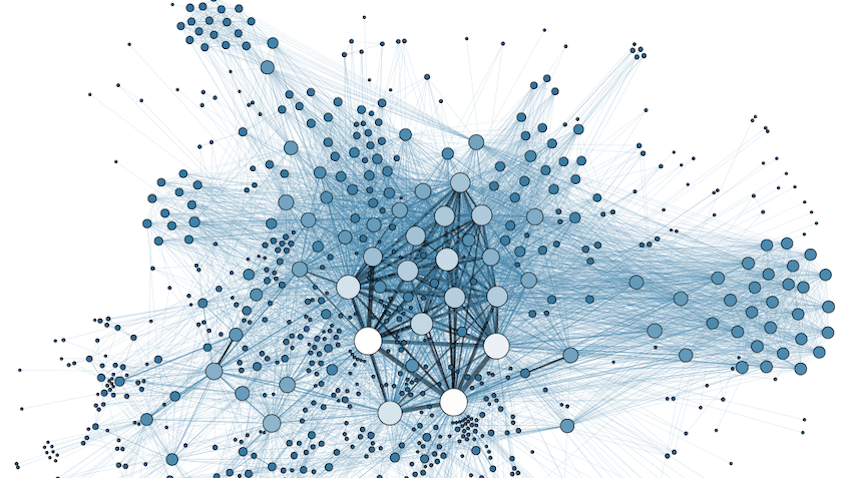
Georgia Tech Researchers Contribute 13 Papers to Premier Visualization Conference
Georgia Tech contributed to 13 papers and two workshops this week at IEEE VIS 2020, the premier forum for advances in theory, methods, and applications of visualization and visual analytics.
The conference highlights research from universities, government, and industry around the world. It is comprised of three separate events: IEEE Visual Analytics Science and Technology (VAST), IEEE Information Visualization (InfoVis), and IEEE Scientific Visualization (SciVis). Like other conferences throughout the Covid-19 pandemic, VIS was held virtually.
Georgia Tech’s research was highlighted by one VAST Best Poster Research Award Honorable Mention titled Mapping Researchers with PeopleMap. The paper – authored by Jon Saad-Falcon, Omar Shaikh, Zijie J. Wang, Austin P. Wright, Sasha Richardson, and Polo Chau – presents an open-source interactive tool that uses natural language processing to create visual maps for researchers based on their research interests and publications.
“Discovering research expertise at universities can be a difficult task,” the paper contends. “Directories routinely become outdated, and few help in visually summarizing researchers’ work or supporting the exploration of shared interests among researchers. This results in lost opportunities for both internal and external entities to discover new connections, nurture research collaboration, and explore the diversity of research.”
Also of note, new School of Computational Science & Engineering Chair Haesun Park received recognition for a 2010 IEEE VAST Paper. The paper received a Test of Time Award, recognizing it for continued contributions to the visual analytics and visualization community. The paper is titled iVisClassifier: An Interactive Visual Analytics System for Classification Based on Supervised Dimension Reduction and co-authored by Jaegul Choo, Hanseung Lee, and Jaeyeon Kihm.
School of Interactive Computing Ph.D. student Emily Wall, who is advised by Associate Professor Alex Endert, was also recognized with the VGTC Outstanding Dissertation Honorable Mention for her work Detecting and Mitigating Human Bias in Visual Analytics.
“People are susceptible to a multitude of biases, including perceptual biases and illusions; cognitive biases like confirmation bias or anchoring bias; and social biases like racial or gender bias that are borne of cultural experiences and stereotypes,” Wall contends. “As humans are an integral part of data analysis and decision making in many domains, their biases can be injected into and even amplified by models and algorithms.”
Her work aims to develop a better understanding of the role human bias plays in visual data analysis by defining bias, detecting bias, and mitigating bias.
Explore more about Georgia Tech’s contributions to IEEE VIS at the links below, or visit the Georgia Tech Visualization Lab. You can follow the lab on Twitter at @GT_Vis.
Georgia Tech at IEEE VIS 2020
Papers
- SafetyLens: Visual Data Analysis of Functional Safety of Vehicles (Arpit Narechania, Ahsan Qamar, and Alex Endert)
- NL4DV: A Toolkit for Generating Analytic Specifications for Data Visualization from Natural Language Queries (Arpit Narechania, Arjun Srinivasan, and John Stasko)
- Interweaving Multimodal Interaction with Flexible Unit Visualizations for Data Exploration (Arjun Srinivasan, Bongshin Lee, and John Stasko)
- What are Data Insights to Professional Visualization Users? (Po-Ming Law, Alex Endert, and John Stasko)
- Characterizing Automated Data Insights (Po-Ming Law, Alex Endert, and John Stasko)
- CNN Explainer: Learning Convolutional Neural Networks with Interactive Visualization (Zijie J. Wang, Robert Turko, Omar Shaikh, Haekyu Park, Nilaksh Das, Fred Hohman, Minsuk Kahng, Duen Horng (Polo) Chau)
- Bluff: Interactively Deciphering Adversarial Attacks on Deep Neural Networks (Nilaksh Das, Haekyu Park, Zijie J. Wang, Fred Hohman, Robert Firstman, Emily Rogers, Duen Horng (Polo) Chau)
- How Does Visualization Help People Learn Deep Learning? Evaluating GAN Lab with Observational Study and Log Analysis (Minsuk Kahng, Duen Horng (Polo) Chau)
- Mapping Researchers with PeopleMap (Jon Saad-Falcon, Omar Shaikh, Zijie J. Wang, Austin P. Wright, Sasha Richardson, Duen Horng (Polo) Chau)
- LEGION: Visually compare modeling techniques for regression (Subhajit Das, Alex Endert)
- CAVA: A Visual Analytics System for Exploratory Columnar Data Augmentation Using Knowledge Graphs (Dylan Cashman, Shenyu Xu, Subhajit Das, Florian Heimerl, Cong Liu, Shah Rukh Humayoun, Michael Gleicher, Alex Endert, Remco Chang)
- A Comparative Analysis of Industry Human-AI Interaction Guidelines (Austin P. Wright, Zijie J. Wang, Haekyu Park, Grace Guo, Fabian Sperrle, Mennatallah El-Assady, Alex Endert, Daniel Keim, Duen Horng (Polo) Chau)
- Toward A Bias-Aware Future for Mixed Initiative Visual Analytics (Adam Coscia, Duen Horng (Polo) Chau, Alex Endert)
Recognitions
- iVisClassifier: an Interactive Visual Analytics System for Classification Based on Supervised Dimension Reduction (Jaegul Choo, Hanseung Lee, Jaeyeon Kihm and Haesun Park)
- Detecting and Mitigating Human Bias in Visual Analytics (Emily Wall (Advisor: Alex Endert))
Workshops
- MoVIS '20 (Organizers: Clio Andris, Somayeh Dodge, Alan MacEachren)
- VISxAI '20 (Organizers: Adam Perer, Duen Horng (Polo) Chau, Fred Hohman, Hendrik Strobelt, Mennatallah El-Assady)


